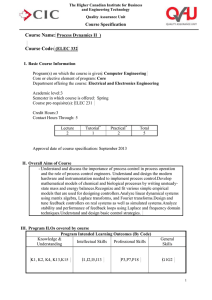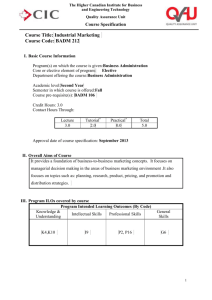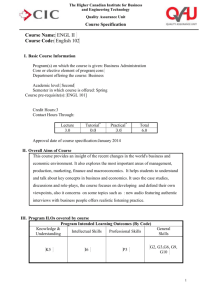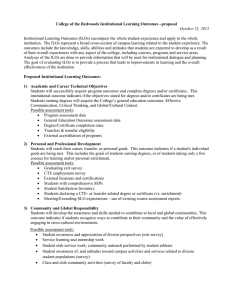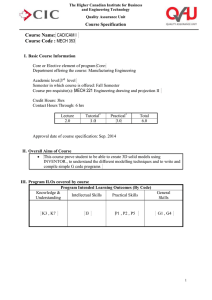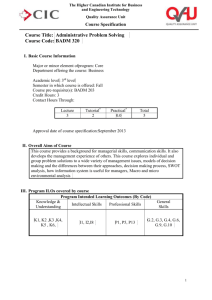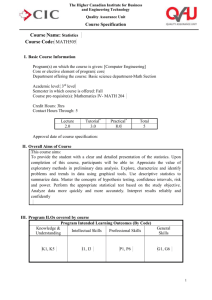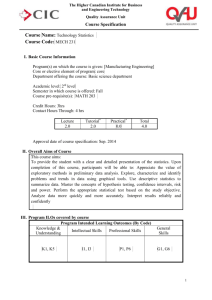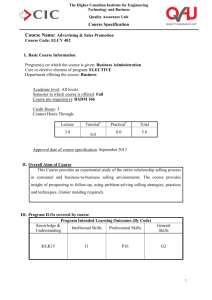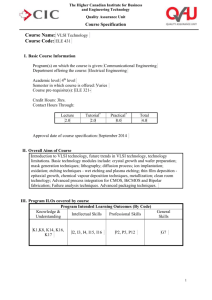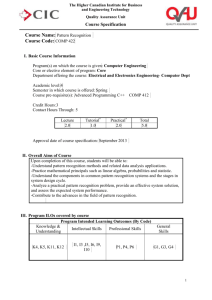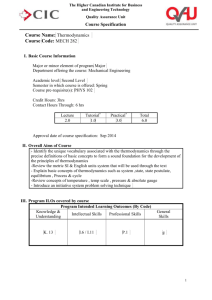COURSE TITLE (COURSE CODE)
advertisement
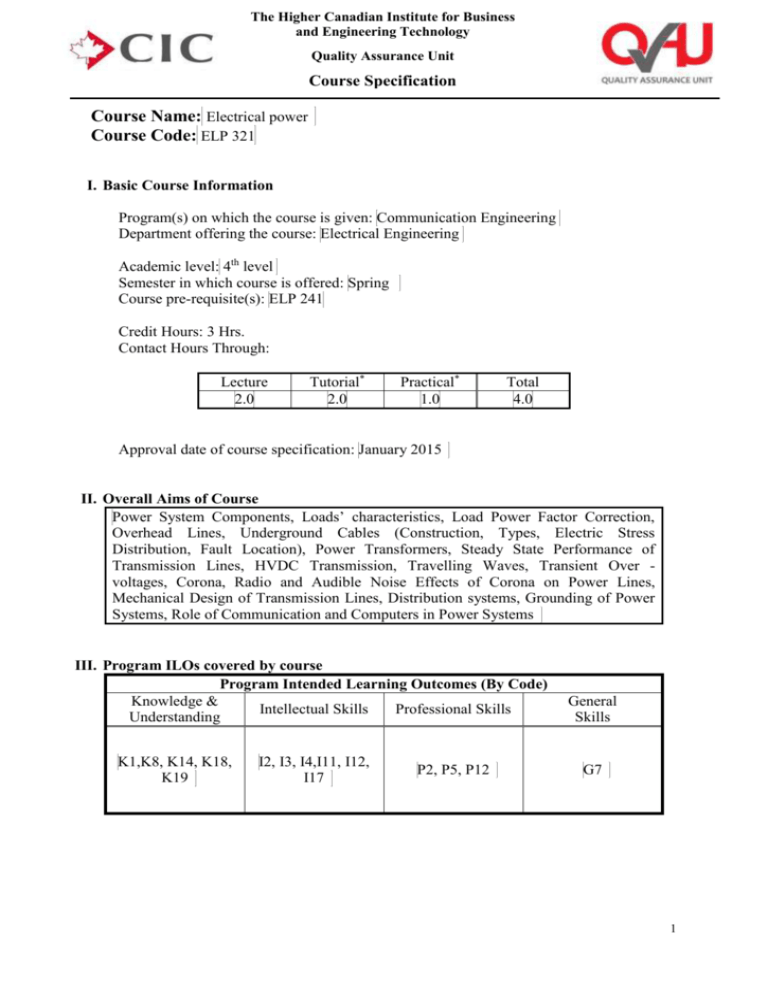
The Higher Canadian Institute for Business and Engineering Technology Quality Assurance Unit Course Specification Course Name: Electrical power Course Code: ELP 321 I. Basic Course Information Program(s) on which the course is given: Communication Engineering Department offering the course: Electrical Engineering Academic level: 4th level Semester in which course is offered: Spring Course pre-requisite(s): ELP 241 Credit Hours: 3 Hrs. Contact Hours Through: Lecture 2.0 Tutorial* 2.0 Practical* 1.0 Total 4.0 Approval date of course specification: January 2015 II. Overall Aims of Course Power System Components, Loads’ characteristics, Load Power Factor Correction, Overhead Lines, Underground Cables (Construction, Types, Electric Stress Distribution, Fault Location), Power Transformers, Steady State Performance of Transmission Lines, HVDC Transmission, Travelling Waves, Transient Over voltages, Corona, Radio and Audible Noise Effects of Corona on Power Lines, Mechanical Design of Transmission Lines, Distribution systems, Grounding of Power Systems, Role of Communication and Computers in Power Systems III. Program ILOs covered by course Program Intended Learning Outcomes (By Code) Knowledge & Intellectual Skills Professional Skills Understanding K1,K8, K14, K18, K19 I2, I3, I4,I11, I12, I17 P2, P5, P12 General Skills G7 1 The Higher Canadian Institute for Business and Engineering Technology Quality Assurance Unit Course Specification IV. Intended Learning Outcomes of Course (ILOs) a. Knowledge and Understanding On completing the course, students should be able to: k. 1 Recognize and express competence in university level mathematics, natural sciences, engineering fundamentals, and specialized engineering knowledge appropriate to the program. k. 2 Extend practical application of theories in different fields through projects and field studies. k. 3 Generalize unique oriented Knowledge in the relevant fields. k. 4 Identify principles and methods of design used in electrical and electronic engineering. k. 5 Identify the principles design of electrical power circuits and components; k. 6 Classify the fabrication methods of electrical circuits b. Intellectual/Cognitive Skills On completing the course, students should be able to: i.1 Apply appropriate knowledge and skills to Recognize, Develop, Examine, and solve complex engineering problems in order to reach substantiated conclusions. i.2 Apply brainstorming and analyze techniques to deal with problems and to develop new ideas. i.3 Analyze and rate the characteristics and performance of components, systems and processes i.4 Prepare a report on a project or assignment. i.5 Synthesis the electronic systems for electrical power electronics circuit. c. Practical/Professional Skills On completing the course, students should be able to: p.1 Compose and apply the appropriate mathematical methods for modeling and analyzing problems in electrical, electronic and communications engineering. p.2 Prepare and utilize the relevant test and measurement equipment and experimental laboratory work p.3 Develop the systems, components and processes and test the design ideas in the laboratory or through simulation, with technical analysis and critical evaluation of results. d. General and Transferable Skills On completing the course, students should be able to: g.1 Search for information in the new technology of power electronics circuits V. Course Matrix Contents Main Topics / Chapters 12345- Power System Components Fault Location Power Power Transformer Corona Effect Power Systems Net Teaching Weeks Duration (Weeks) 2 3 3 1 4 13 Course ILOs Covered by Topic (By ILO Code) K&U I.S. P.S. G.S. k1, k3 i4 p1 k2, k3 i1 p1 k3, k4 i1, i2, i4 p3 g1 k5 i3, i4 p2 k5 i4 2 The Higher Canadian Institute for Business and Engineering Technology Quality Assurance Unit Course Specification VI. Course Weekly Detailed Topics / hours / ILOs Week No. 1 2 3 4 5 6 7 8 9 10 11 12 13 14 15 Contact Hours Theoretical Practical Hours Hours* Total Hours Sub-Topics Power System Components, Loads’ 2 characteristics, Load Power Factor Correction, 4 Overhead Lines, Underground Cables (Construction, Types, Electric Stress 4 Distribution, Fault Location) Power Transformers 4 Power Transformers 4 , Steady State Performance of 4 Transmission Lines Midterm Exam , HVDC Transmission 4 Traveling Waves, Transient Over 4 voltages, Corona, Radio and Audible Noise Effects of Corona on Power Lines, 4 Power system 4 Power system 4 Power system 4 Revision 4 Final Exam Total Teaching Hours 2 2 2 2 2 2 2 2 2 2 2 2 2 2 2 2 2 2 2 2 2 2 2 2 2 VII. Teaching and Learning Methods Teaching/Learning Method Lectures & Seminars Tutorials Computer lab Sessions Practical lab Work Reading Materials Web-site Searches Research & Reporting Problem Solving / Problem-based Learning Projects Independent Work Group Work Case Studies Presentations Simulation Analysis Course ILOs Covered by Method (By ILO Code) All k1, k2, k4 Intellectual Skills All i1, i2, i3 k5 i5 K&U k6 Professional Skills All p3 General Skills g1 p3 g1 i4 3 The Higher Canadian Institute for Business and Engineering Technology Quality Assurance Unit Course Specification Others (Specify): VIII. Assessment Methods, Schedule and Grade Distribution Course ILOs Covered by Method (By ILO Code) Assessment Method K&U I.S. P.S. G.S. Midterm Exam Final Exam Quizzes k1, k2, k3 All k1, k3 i1, i2, i3 20% i1, i2, i3 i1, i2, i3 10% p1, p2, p3 p3 Course Work Report Writing Case Study Analysis Oral Presentations Practical Group Project Individual Project k5, k6 Assessment Weight / Percentage Week No. 5% g1 i4, i5 5% 10% Others (Specify): IX. List of References Essential Text Books Essential books (text books) Essential Books (Text Books) Power Electronics Circuits and Devices, Muhammad Rashid Textbook ISBN #: www.prenhall.com (student resources). Course notes Lecture Handouts Recommended books Microelectronics, Adel Sedra Periodicals, Web sites, etc … X. Facilities required for teaching and learning Big sized lecture rooms. Computers (Personal & Notebook). Data Show Course coordinator: Associate Professor/ Tamer Abdel Rahman Head of Department: Associate Professor/ Tamer Abdel Rahman Date: January 2015 4
